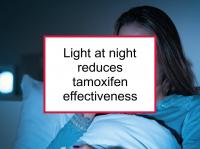Melatonin is a hormone that communicates information concerning external light conditions to various parts of the body. Melatonin is synthesized and secreted by the pineal gland in the brain. It is known primarily for its involvement in the regulation of circadian rhythms (the body clock), however it has also been shown to be chemopreventive.
Low levels of melatonin due to excessive exposure to light or as natural part of the aging process is associated with increased risk of breast cancer. Now a new study has reported that exposure to dim light at night induces tamoxifen resistance in an animal model of hormone receptor positive (ER+/PR+) breast cancer.
Latest research finds light at night causes tamoxifen resistance
The study referenced at the beginning of this news story was designed to investigate the effects of disturbed light/dark cycles in an animal model of tamoxifen-treated breast cancer. Exposure to light at night reduces the nocturnal production of melatonin (which in turn inhibits breast cancer growth).
In the study, the authors implanted ER+/PR+ MCF-7 human breast cancer cells in rats and observed the growth of the tumor xenografts under various conditions.
Altering normal light/dark cycles by adding dim light exposure at night was found to accelerate the development of tumors (speeding their metabolism and growth) and cause tamoxifen resistance. These effects were absent in animals not exposed to dim light at night and in animals subjected to dim light at night but also administered melatonin.
Importantly, the authors demonstrated that melatonin acted not only to inhibit tumor metabolism and induce tumor regression, but also to reestablish the sensitivity of breast tumors to treatment with tamoxifen.
The authors conclude that disturbances in nocturnal melatonin production caused by exposure to dim light at night can render tumors insensitive to tamoxifen.
Please see our article on what to eat during tamoxifen treatment for more information.
